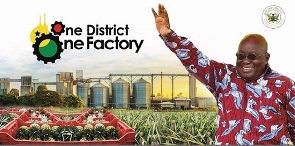 President Nana Addo Dankwa Akufo-Addo
President Nana Addo Dankwa Akufo-Addo
Cynicism in Government’s flagship One-District-One-Factory (1D1F) policy is a clear demonstration of lack of self-believe and worth undermining Ghanaians’ ability to understand the policy to create jobs for themselves and not government, Mr Delali Ndo, Chairman, Advisory Committee on Investment in the Volta Region has said.
He said, “My understanding of the 1D1F policy, is an expression of the President’s confidence in the Ghanaian to rise to the challenges of the time, so, if I stand expecting the President to come and establish a factory for me, I am telling myself, I lack the ability to meet the challenge because the factory will not belong to the President, and I will remain in poverty.”
The Advisory Committee Chairman said Government’s decision was purely trade facilitation and re-engineering in the 1D1F policy framework and not the establishment of new factories from ground zero.
Mr Ndo who was speaking to the Ghana News Agency in an interview said the policy, came in three categories, those with existing venture needing financial re-engineering; investors with money to invest from scratch; and those with venture and entrepreneurial concepts needing alignment with the government facilitation and enablers for a smooth take-off.
Mr Ndo said Reagvin Company, is doing the production of ethanol and cassava chips at Tokokoe, in the Ho Municipality, are already existing projects that had been grafted for financial reengineering under the 1D1F.
He said ‘Letters of Credit’ had been given to Reagvin to access funds to expand and others are in similar pipelines.
Mr Ndo said establishing a factory was a complex venture demanding adequate planning and a sustainable raw material base, which was crucial to that business to thrive.
“Real thinking must go into the establishment of factories,” to avoid the repeat of the Juapong Textile Factory scenario, where the raw material base is weak rendering it unproductive for many years now, he said.
Mr Ndo said as with every business, the 1D1F project started with a business plan with serious demands for technical and budgeting processes for implementation.
He said it was an evolutionary trend in response to statehood, to which every Ghanaian must take advantage of, to fight poverty, which had no political colour but many mouths to feed.
Mr Ndo said nine out of 23 projects had been selected by a South African company for funding with some interests too from Chinese and Swedish companies, who had jointly expressed interests to partner entrepreneurs and businesses to set-up in the region.
Mr Ndo said some businesses and entrepreneurs from the National Democratic Congress (NDC) have also applied to be part of the scheme and said "these are matters of bread and butter and not politics."
Mrs Josephine Dzotsi, Volta Regional Director of Trade and Industry (MOTI) told the Ghana News Agency in another interview that about 33 projects has come under 1D1F project in the region and her office continued to receive more applications.
She said four of the Companies were currently operational in the region, two of which were already in existence.
They include Goshen Company, which is into the production of large-scale maize at Torgorme and KOP Farms, all in the North Tongu District; with Caltec, producing ethanol and cassava chips at Hodzo and IC Agritec with a fish farm both in the Ho Municipality.
Mrs Dzotsi said MOTI was still negotiating with the banks to get interests rates to a single digit for applicants of the 1D1F policy explaining that delays associated with accessing the funds was due to diligence being deployed by the financial institutions to avoid wastage and paying monies into wrongful hands.
Dr Archibald Yao Letsa, Volta Regional Minister said in an interview that Government’s role in the 1D1F policy framework was trade or business facilitation, far from leading the charge to establish factories.
He said these misconceptions are causing confusion in the minds of the public and needed to be addressed by the media.